The destructive power of Mike Pence
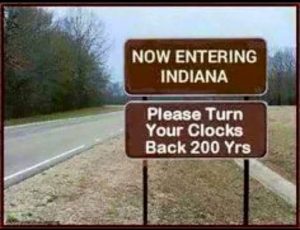 He may be Vice President now, but not so long ago Mike Pence was governor of the Hoosier state: Indiana, the 38th largest by area and the 16th most populous of the 50 United States. But you don’t have to be a big ruler to mess things up. Pence managed to seriously dent the reputation ánd the economy of his state, all in the name of Freedom of Religion. For which he was rewarded by the Republicans to become Trump’s right hand (and in case something happens to Trump, the POTUS). Freedom of Religion in this case meant the right to discriminate, and in fact to withhold rights from certain groups of people. In this case LGBT. As a bonus, he has ‘dangerous’ views on the climate, women, criminal justice, public health and he supports a 19th century energy policy.
He may be Vice President now, but not so long ago Mike Pence was governor of the Hoosier state: Indiana, the 38th largest by area and the 16th most populous of the 50 United States. But you don’t have to be a big ruler to mess things up. Pence managed to seriously dent the reputation ánd the economy of his state, all in the name of Freedom of Religion. For which he was rewarded by the Republicans to become Trump’s right hand (and in case something happens to Trump, the POTUS). Freedom of Religion in this case meant the right to discriminate, and in fact to withhold rights from certain groups of people. In this case LGBT. As a bonus, he has ‘dangerous’ views on the climate, women, criminal justice, public health and he supports a 19th century energy policy.
What happens in Indiana…
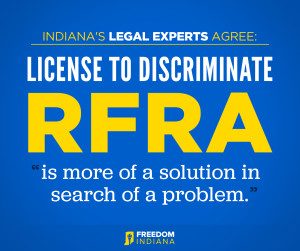 The state of Indiana came under attack in March 2015, when Republican Governor Mike Pence signed “Indiana Senate Bill 101” into law. This law was presented as “Religious Freedom Restoration Act” (RFRA), a reinforcement of the federal law from 1993, introduced by President Clinton. It was passed not long after the rollercoaster ride of same-sex marriage reached Indiana: first the state legislature failed to pass a ballot initiative to ban same-sex marriage, and then the 7th Circuit struck down the state law banning same-sex marriage. Similar RFRA laws had been introduced in 19 other states in the 2 decades since the federal law, without people getting upset and calling for boycotts. What was different in Indiana?
The state of Indiana came under attack in March 2015, when Republican Governor Mike Pence signed “Indiana Senate Bill 101” into law. This law was presented as “Religious Freedom Restoration Act” (RFRA), a reinforcement of the federal law from 1993, introduced by President Clinton. It was passed not long after the rollercoaster ride of same-sex marriage reached Indiana: first the state legislature failed to pass a ballot initiative to ban same-sex marriage, and then the 7th Circuit struck down the state law banning same-sex marriage. Similar RFRA laws had been introduced in 19 other states in the 2 decades since the federal law, without people getting upset and calling for boycotts. What was different in Indiana?
 It was a combination of timing, purpose and what’s in the bill. Opponents of marriage equality (mostly: the “religious” right) constantly told horror stories of photographers, florists and bakers who were fined for refusing to serve gay couples getting married. The bill’s supporters clearly meant to target LGBT community, and it didn’t help that the governor almost secretly signed the law, in the presence only of a number of representatives from religious organizations and some known anti-LGBT zealots: Micah Clark, executive director of the American Family Association of Indiana; Curt Smith, president of the Indiana Family Institute; and Eric Miller, executive director of Advance America.
It was a combination of timing, purpose and what’s in the bill. Opponents of marriage equality (mostly: the “religious” right) constantly told horror stories of photographers, florists and bakers who were fined for refusing to serve gay couples getting married. The bill’s supporters clearly meant to target LGBT community, and it didn’t help that the governor almost secretly signed the law, in the presence only of a number of representatives from religious organizations and some known anti-LGBT zealots: Micah Clark, executive director of the American Family Association of Indiana; Curt Smith, president of the Indiana Family Institute; and Eric Miller, executive director of Advance America.
Legal Professor Tobias Barrington Wolff provided a concise description of how the Indiana RFRA was substantially different from others in three ways, in brief: 1. Private parties were harmed. 2. There is no accountability. 3. Corporations are given special rights. Additionally, Lambda Legal pointed out that Indiana’s RFRA is different in that “(it) is so broadly written that someone can sue even without their religious beliefs having actually been burdened simply by claiming that is “likely” to happen.”
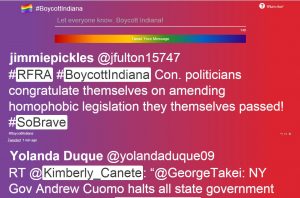 The backlash was enormous, more or less initiated by celebrity LGBT activist George Takei, who launched a #BoycottIndiana twitter campaign, which immediately became trending. Takei was followed in one way or another by other celebrities, such as Miley Cyrus, Ashton Kutchner, Larry King, Keith Olbermann, Hillary Clinton, Kathy Griffin and – of course – Martina Navratilova. Author Stephen King tweeted: “Indiana’s Religious Freedom Restoration act is gay discrimination, pure and simple. You can frost a dog turd, but it’s still a dog turd.”
The backlash was enormous, more or less initiated by celebrity LGBT activist George Takei, who launched a #BoycottIndiana twitter campaign, which immediately became trending. Takei was followed in one way or another by other celebrities, such as Miley Cyrus, Ashton Kutchner, Larry King, Keith Olbermann, Hillary Clinton, Kathy Griffin and – of course – Martina Navratilova. Author Stephen King tweeted: “Indiana’s Religious Freedom Restoration act is gay discrimination, pure and simple. You can frost a dog turd, but it’s still a dog turd.”
CEO’s united
Within days of the governor’s signature, the CEO of Apple (Tim Cook, who came out as gay a year earlier) criticized the law, 
and Salesforce CEO Marc Benioff cancelled events planned in Indiana. Jeremy Stoppelman, CEO of Yelp, delivered an open letter to all states that intend to discriminate, stating “… it is unconscionable to imagine that Yelp would create, maintain, or expand a significant business presence in any state that encouraged discrimination by businesses against our employees, or consumers at large.” Anthem, Roche Diagnostics, Cummins, Indiana University Health, Eli Lilly, NASCAR, General Electric and PayPal were among the companies that raised concerns. Leaders from some 39 tech companies and organizations also condemned the legislation. Billionaire investor Warren Buffett joined their voices. “I think if people can exercise discrimination based on sexual orientation, then it’s wrong,” he told CNN.
Angie’s List’s CEO Bill Oesterle canceled a $40 million deal that was going to expand their headquarters in the state and add 1,000 jobs over five years, and was even thinking about moving out of the state altogether. Marriott CEO Arne Sorenson stated in a video released on MSNBC: “The legislation in Indiana – and there are some bills being considered in other states – is not just pure idiocy from a business perspective – and it is that – the notion that you can tell businesses somehow that they are free to discriminate against people based on who they are is madness.” Imagine that, coming from a Mormon company… !
How others reacted
The cities of San Francisco, Portland, DC, New York, Denver and Seattle banned government sponsored trips to Indiana, as did the states of Connecticut – which was criticized for having an RFRA too – New York and Washington.
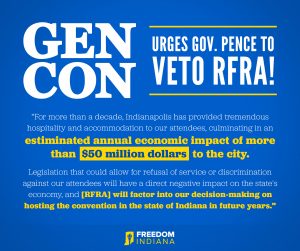 And it did not stop there. Gen Con, America’s largest gaming convention with more than 56,000 attendees, announced it would have to reconsider holding their annual convention in Indiana. A loss of $50 million annually to the state. AFSCME (American Federation of State, County and Municipal Employees), announced that they were pulling the union’s 2015 Women’s Conference out of Indianapolis. The NCAA described itself as “especially concerned” and was monitoring developments to see if it should cancel future sports events in Indiana. The National Forensic Association announced it was withdrawing its 2016 national competition from Muncie, Indiana. The powerful National Association for Stock Car Auto Racing (NASCAR), organizer of the famous Indianapolis 500 also chipped in, as did Indianapolis Motor Speedway. The NBA, WNBA and Indiana Pacers issued a joint statement: “The game of basketball is grounded in long established principles of inclusion and mutual respect. We will continue to ensure that all fans, players and employees feel welcome at all NBA and WNBA events in Indiana and elsewhere.”
And it did not stop there. Gen Con, America’s largest gaming convention with more than 56,000 attendees, announced it would have to reconsider holding their annual convention in Indiana. A loss of $50 million annually to the state. AFSCME (American Federation of State, County and Municipal Employees), announced that they were pulling the union’s 2015 Women’s Conference out of Indianapolis. The NCAA described itself as “especially concerned” and was monitoring developments to see if it should cancel future sports events in Indiana. The National Forensic Association announced it was withdrawing its 2016 national competition from Muncie, Indiana. The powerful National Association for Stock Car Auto Racing (NASCAR), organizer of the famous Indianapolis 500 also chipped in, as did Indianapolis Motor Speedway. The NBA, WNBA and Indiana Pacers issued a joint statement: “The game of basketball is grounded in long established principles of inclusion and mutual respect. We will continue to ensure that all fans, players and employees feel welcome at all NBA and WNBA events in Indiana and elsewhere.”
 And there were many more outcries against the measure. Of course, memes and jokes also started making their rounds, portraying Indiana as “A great place to be a bigot”. In a travel ad paid for by the “Indiana Board of Terrible People,” a soothing woman’s voice assures us that there’s plenty to do in the Hoosier state, “whether you’re a family of bigots, a couple of bigots, or just an individual bigot.”
And there were many more outcries against the measure. Of course, memes and jokes also started making their rounds, portraying Indiana as “A great place to be a bigot”. In a travel ad paid for by the “Indiana Board of Terrible People,” a soothing woman’s voice assures us that there’s plenty to do in the Hoosier state, “whether you’re a family of bigots, a couple of bigots, or just an individual bigot.”
The governor’s reaction
Governor Pence was shocked by the wave of criticism – but more so because 19 other states had preceded him unharmed, one way or another. He felt discriminated against! On ABC’s This Week with George Stephanopoulos he did not answer directly when asked at least six times whether it would be legal for a business to refuse to serve gay customers. After first stating that the law would not be changed, he withdrew a day later saying “I support religious liberty, and I support this law, but we are in discussions with legislative  leaders this weekend to see if there’s a way to clarify the intent of the law.” Followed by: “I don’t believe for a minute that it was the intention of the general assembly to create a license to discriminate or right to deny services to gays, lesbians or anyone else in the state, and it certainly wasn’t my intent, but I can appreciate that has become the perception,” Pence said. And his nose grew.
leaders this weekend to see if there’s a way to clarify the intent of the law.” Followed by: “I don’t believe for a minute that it was the intention of the general assembly to create a license to discriminate or right to deny services to gays, lesbians or anyone else in the state, and it certainly wasn’t my intent, but I can appreciate that has become the perception,” Pence said. And his nose grew.
Even Fox News backed away from the law. Fox anchor Bret Baier observed that the Indiana law was far broader than either the federal Act signed in 1993 or RFRAs in 19 other states – one of Pence’s talking points in defending the measure. Basically, while the federal RFRA prohibits government from placing a substantial burden on the free exercise of religion, Indiana’s law extends that rule to corporations and individuals as well.
Pence took a huge hit in public ratings, but he dragged the state’s reputation with him. It did gain him the attention of the far-right conservatives, eventually leading to his teaming up with Donald Trump.
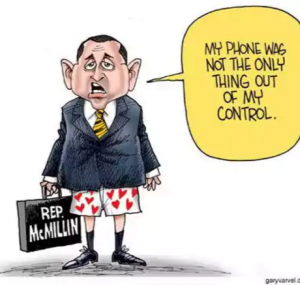 To illustrate the duplicity of the discriminating lawmakers, “in the name of good morals”: Indiana House Majority Leader Jud McMillin, a cosponsor of the law resigned his seat just a few months later, after a sexually explicit video starring the representative with someone other than his wife was sent via text message from his cell phone. It was the second time McMillin resigned from a job over sexual misconduct allegations (while he also faced petty theft allegations and vehicular homicide charges). His campaign website listed marriage discrimination as his top issue. “I will protect the integrity of the institution of marriage,” the site read. “In southeastern Indiana the family has always been the foundation of our strength of community. Our relationships with our wives, husbands, parents, children, siblings and other loved ones provides the glue that binds our common purpose. In these times of turmoil the rest of the country could learn something from our example.” So much for family values and good morals – or good examples.
To illustrate the duplicity of the discriminating lawmakers, “in the name of good morals”: Indiana House Majority Leader Jud McMillin, a cosponsor of the law resigned his seat just a few months later, after a sexually explicit video starring the representative with someone other than his wife was sent via text message from his cell phone. It was the second time McMillin resigned from a job over sexual misconduct allegations (while he also faced petty theft allegations and vehicular homicide charges). His campaign website listed marriage discrimination as his top issue. “I will protect the integrity of the institution of marriage,” the site read. “In southeastern Indiana the family has always been the foundation of our strength of community. Our relationships with our wives, husbands, parents, children, siblings and other loved ones provides the glue that binds our common purpose. In these times of turmoil the rest of the country could learn something from our example.” So much for family values and good morals – or good examples.
The damage has been done
The controversy over the RFRA generated 3,000 media reports within 2 weeks, most of them with a negative connotation. One convention was immediately lost: the AFSCME public employees union canceled its 900-person convention in Indianapolis. Another group, the Disciples of Christ church, announced it would cancel its 2017 convention in the city. The organizers of eight other conventions “expressed concern” about holding their events in Indianapolis. Visit Indy received about 800 emails from people saying they would cancel their visits this spring and summer because of their disagreement with the law (every complaint received normally stands for 10 dissatisfied customers, 9 of whom do not bother to complain).
The RFRA controversy was serious enough for the credit rating company Moody’s to call it a “negative credit development” for the finances of Indiana and Indianapolis. The city faces “increased risk to its hospitality-related revenues” due to a possible downturn in tourism and convention business, Moody’s said in its weekly credit outlook report.
The game plan became to reassure, rebrand 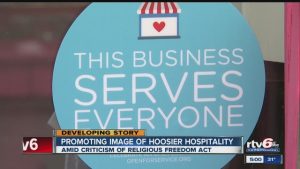 and return to the old state of affairs when Indiana was know for the Hoosier Hospitality. The 62 staffers of Visit Indy were going to put on a “full-court press” to win back conventions, meetings and tourists who have doubts about coming to Indiana. At stake was a thriving tourism and convention industry that brings 26 million visitors a year to Indianapolis and supports 75,000 full-time jobs. Tourists and conventions have an estimated $4.4 billion yearly economic impact on the city.
and return to the old state of affairs when Indiana was know for the Hoosier Hospitality. The 62 staffers of Visit Indy were going to put on a “full-court press” to win back conventions, meetings and tourists who have doubts about coming to Indiana. At stake was a thriving tourism and convention industry that brings 26 million visitors a year to Indianapolis and supports 75,000 full-time jobs. Tourists and conventions have an estimated $4.4 billion yearly economic impact on the city.
The aftermath
Some of the protests came from companies who did not specifically object to the (possible) discrimination of LGBT, but to the negative impact on business the law might have, or the fact that the company would not be able to attract or retain (good) employees, thereby negating the human rights and equality issue.
In the wake of travel boycotts it became clear that even a perceived anti-gay bias 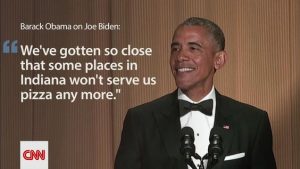 can do plenty of damage. Indiana’s tourism agencies pooled $2 million and hired PR giant Porter Novelli, hoping to “remind the world that Hoosiers welcome everyone.”
can do plenty of damage. Indiana’s tourism agencies pooled $2 million and hired PR giant Porter Novelli, hoping to “remind the world that Hoosiers welcome everyone.”
The drama did not go unnoticed in presidential circles either. At the 2015 White House Correspondents’ Dinner, President Obama quipped: “I tease Joe sometimes, but he has been at my side for seven years, I love that man. He’s not just a great vice president, he is a great friend. We’ve gotten so close, in some places in Indiana they won’t serve us pizza anymore.”
Mike Pence, and the future of civilization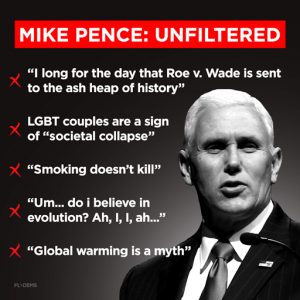
It was not just the LGBT Pence was after. “Time for a quick reality check,” he wrote in 2000. “Despite the hysteria from the political class and the media, smoking doesn’t kill. In fact, 2 out of every three smokers does not die from a smoking related illness and 9 out of ten smokers do not contract lung cancer.” Was he blinded by science, or did business interests play a role?
And there is more. His campaign site from 2001 made it clear that he did not agree with the scientific consensus around climate change, claiming that the Earth was “actually cooler than it was 50 years ago“ and that global warming was a “myth.” As governor, he refused to implement Obama’s Clean Power Plan – an act of insubordination, to put it mildly. He consistently voted against climate legislation and efforts to reduce greenhouse gas emissions during his time in the House.
Following the 2010 Deepwater Horizon disaster — which killed 11 people and spilled 210 million gallons of oil into the Gulf of Mexico — Pence and other House Republicans made the curious choice to call for more offshore drilling. He was also quick to place blame on the Obama administration rather than BP itself.
He repeatedly vocalized his support for the Keystone XL pipeline, saying that the project would create 42,000 long-term jobs, when in reality, it would have been more like 50 (according to Greenpeace). And guess what came up during the first week of his administration – and with “his” I mean Trump (or do I?).
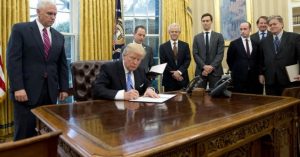 His radical Christian background blurred his vision and he defended a number of worrying things. He brought back abortion into illegality in Indiana, and it took him only a few days as VP to do the same for the country via a “Global Gag Rule”. This means US funded organizations are forbidden to even discuss abortion, contraception and HIV issues, a rule that will probably lead to the death of well over 100,000 women a year.You can also see here to know more about sexual wellness.Because the bible wants it. The picture on the left shows 7 men, deciding on the health and rights of women worldwide.
His radical Christian background blurred his vision and he defended a number of worrying things. He brought back abortion into illegality in Indiana, and it took him only a few days as VP to do the same for the country via a “Global Gag Rule”. This means US funded organizations are forbidden to even discuss abortion, contraception and HIV issues, a rule that will probably lead to the death of well over 100,000 women a year.You can also see here to know more about sexual wellness.Because the bible wants it. The picture on the left shows 7 men, deciding on the health and rights of women worldwide.
Pence became VP of the USA, after he was ‘chosen’ by Trump as a running mate to unite the Republican Party. Mrs. Clinton’s campaign called Mr. Pence “the most extreme pick in a generation,” citing his views on abortion, gay rights, immigration and the minimum wage. It was the best the Republicans could do. Trump was hesitant. But it opened up the door to many more disastrous ideas becoming law, and the first week of their administration was a sad display of that. He’s just one of the many reasons people who care about science, health, equality and non-discrimination are terrified of Trump’s presidency. People have fears for a plethora of reasons. All are valid. Hold your breath. Soon he may rise from Veep to POTUS…

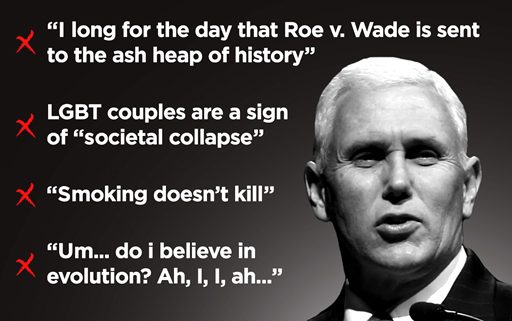


Trackbacks & Pingbacks
[…] The destructive power of Mike Pence […]
Leave a Reply
Want to join the discussion?Feel free to contribute!